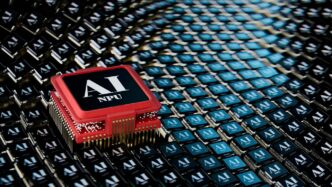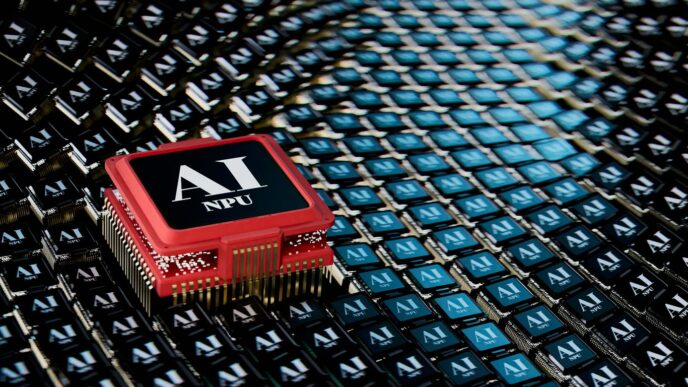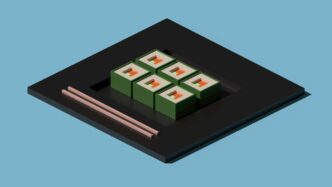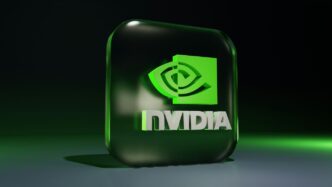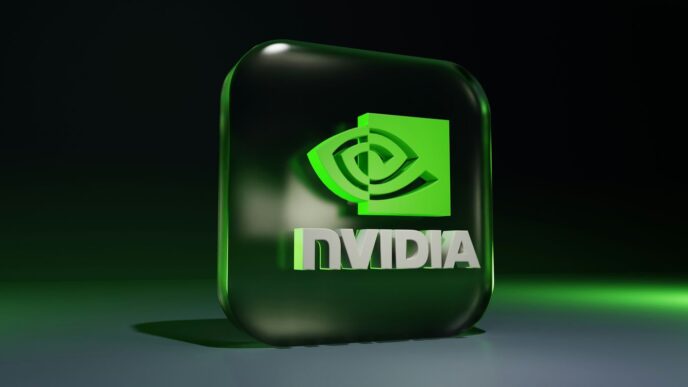Big news in the quantum world! PsiQuantum just snagged a massive $1 billion in new funding, pushing their company value up to a cool $7 billion. They’re aiming to build quantum computers with a million qubits, which is a huge deal. This investment shows a lot of people believe in their plan to use light, or photonics, to make these powerful machines. They’re setting up big operations in places like Chicago and Brisbane, Australia. It’s all about making quantum computing a real thing that can actually solve big problems. We’ll cover the latest PsiQuantum news and what it means.
Key Takeaways
- PsiQuantum raised $1 billion, valuing the company at $7 billion, showing strong investor belief in their photonics approach to quantum computing.
- The company is working towards a goal of one million qubits, aiming for fault-tolerant quantum computers that can tackle complex problems.
- New facilities are being established in Chicago and Brisbane, Australia, to support large-scale quantum computing operations.
- PsiQuantum is using innovative tech like Barium Titanate optical switches and collaborating with Nvidia for hybrid computing.
- The company faces challenges like photon loss but is investing heavily in research to achieve practical quantum applications and overcome these hurdles.
PsiQuantum Secures Significant Funding
So, PsiQuantum just announced they’ve pulled in a massive $1 billion for their Series E funding round. This is a pretty big deal, and it bumps their company valuation up to a cool $7 billion. It really shows that investors are putting their money where their mouth is when it comes to PsiQuantum’s approach to quantum computing, which relies heavily on photonics.
Record-Breaking Series E Investment
This latest funding round was led by some big names like BlackRock, Temasek, and Baillie Gifford, with a bunch of new investors jumping in too, including NVentures, which is NVIDIA’s venture capital arm. It’s not just about the money, though; it’s about the confidence it signals. This cash infusion is set to help PsiQuantum build out some seriously large-scale facilities. We’re talking about breaking ground on utility-scale quantum computing sites in places like Brisbane and Chicago. They’re also planning to deploy prototype systems to test out their architecture and make sure everything integrates properly. Plus, they’ll keep pushing the performance of their quantum photonic chips and their fault-tolerant setup.
Company Valuation Reaches $7 Billion
Hitting a $7 billion valuation is no small feat, especially in the fast-moving world of quantum tech. It puts PsiQuantum in a pretty strong position compared to many of its competitors. This valuation reflects the progress they’ve made over the years, especially since their Series D funding back in 2021. They’ve managed to set up a high-volume manufacturing process for their integrated photonic chipset, which is pretty much the core of their photonic quantum computing. These chips are actually being made at GlobalFoundries’ Fab 8 in New York, which is a major semiconductor foundry. It’s impressive that they’ve gotten this far, and it’s definitely a sign of how serious investors are about the potential of their technology. You can check out some of the latest tech news, including announcements from events like Futurist Miami 2025, on the Apple store.
Investor Confidence in Photonics Approach
What’s really interesting is how much faith investors have in the photonics route. While other companies are exploring different paths, PsiQuantum believes that using photons is the quickest way to get to the million-qubit scale they’re aiming for. They’re betting that by using high-volume semiconductor manufacturing, they can overcome the usual hurdles like manufacturability and cooling that plague other quantum computing efforts. It’s a bold strategy, but this funding suggests that the market is buying into it. They’ve already fabricated key components, like barium titanate optical switches, which is a big step towards getting millions of qubits onto a single platform. This whole setup is designed to tackle some of the most complex problems out there, potentially revolutionizing fields from finance to medicine.
Ambitious Million-Qubit Goal
PsiQuantum isn’t just aiming for a few extra qubits; they’re talking about a million. This is a pretty big jump from what other companies are showing off right now. The idea is to build quantum computers that can actually handle complex problems without errors messing things up. They think using light particles, or photons, is the way to get there. It’s supposed to be easier to scale up compared to other methods that need super cold temperatures.
Here’s a breakdown of their approach:
- Photonics as the Core: Instead of using things like superconducting circuits, PsiQuantum is all about using light. This means they’re working with optical switches made from materials like barium titanate. These are key components for controlling the photons that act as qubits.
- Leveraging Semiconductor Manufacturing: They’re planning to use the same factories that make regular computer chips. This is a big deal because it means they can potentially make a lot of quantum components quickly and at a lower cost, which is important for reaching that million-qubit target.
- Fault Tolerance is Key: The big goal is to have computers that are
Global Expansion and Facilities
PsiQuantum isn’t just talking about big quantum computers; they’re building the places to house them. The company is setting up major operations in both the United States and Australia. This dual-site strategy seems pretty smart, especially with all the talk about global tech competition these days. It means they’re not putting all their eggs in one basket.
They’re building out some serious infrastructure. Think large-scale facilities designed to handle the complex needs of quantum computing. One of these is a big spot in Chicago, reportedly around 200,000 square feet. This place is going to be kitted out with all the necessary cryogenic gear and the special photonic networks they need to make their quantum systems work. It sounds like a massive undertaking, really.
On the other side of the world, Australia is also getting a piece of the action. The government there is putting in a significant amount of money, over $600 million, to support PsiQuantum’s project in Brisbane. This move is seen as a big deal for Australia’s own quantum capabilities, sort of a national investment in future tech. It’s interesting to see how different countries are backing these advanced technology companies.
So, you’ve got these two major hubs:
- Chicago, USA: Focused on building out the core infrastructure and likely a lot of the manufacturing and testing.
- Brisbane, Australia: Supported by government investment, aiming to be a key site for quantum development and operations.
This setup allows them to spread out their operations and tap into different talent pools and resources. It’s a pretty ambitious plan, and it shows they’re serious about scaling up their operations to meet their million-qubit goal.
Technological Innovations and Partnerships
PsiQuantum isn’t just talking big; they’re building big, too. A lot of their progress comes down to some really smart tech choices and working with other companies. They’re using these neat optical switches made from barium titanate. Think of them as super-fast, super-efficient ways to control light signals, which is exactly what you need for a quantum computer that uses photons. These switches are a key part of making their system work reliably.
It’s not all in-house, though. They’ve teamed up with Nvidia, a name you probably know from gaming and AI graphics cards. This partnership is all about creating hybrid computing systems. The idea is to combine the strengths of classical computers, like those Nvidia makes, with the unique power of quantum computers. This way, they can tackle problems that are too tough for either type of computer alone. It’s a smart move to get more done, faster.
Here’s a quick look at some of the tech they’re focused on:
- Barium Titanate Optical Switches: These are the building blocks for directing quantum information. They’re designed to be very low-loss, meaning the light signals don’t get weakened as they pass through.
- Nvidia Collaboration: This joint effort aims to build systems that can use both classical and quantum processing power together. It’s about making quantum computers accessible and useful within existing computing frameworks.
- High-Density Cooling Solutions: Quantum computers need to be kept incredibly cold to work. PsiQuantum is developing ways to pack a lot of computing power into a small space while keeping it at the right super-cold temperatures. This is a big deal for scaling up.
They’re also looking at how to make light travel in new ways. For instance, scientists are exploring zero-index materials that could let light move at speeds faster than normal, which could really change how computers work. This kind of research, like the work happening with light-warping technology, shows the kind of forward-thinking that’s happening in the field. It’s all about pushing the boundaries of what’s possible in computing, and PsiQuantum seems to be right there at the forefront of it.
Market Implications and Future Outlook
PsiQuantum’s recent funding, pushing its valuation to a hefty $7 billion, really shows how much investors believe in their approach to quantum computing. It’s not just about having a lot of qubits; it’s about how you get there. Their focus on photonics, using existing semiconductor manufacturing techniques, seems to be a big draw. This means they might be able to scale up production in a way that’s more practical than some other quantum technologies out there. This massive investment signals a shift from pure research to building real, usable quantum systems.
What does this mean for the broader market? Well, it suggests that quantum computing is moving beyond the theoretical stage and into a phase where companies are seriously trying to build commercially viable products. We’re seeing this trend across the AI space too, where companies are moving past initial hype and focusing on practical applications and the underlying infrastructure needed to support them. For instance, Gartner notes that while GenAI is still important, the real focus is now on data readiness and robust systems to make it work at scale. It’s a similar story for quantum; the focus is shifting to making the technology reliable and accessible.
Transforming Industries with Quantum Advantage
When quantum computers like PsiQuantum’s eventually reach their full potential, they could completely change how we tackle some of the world’s toughest problems. Think about drug discovery, for example. Simulating molecular interactions at a quantum level could speed up the development of new medicines dramatically. Or consider materials science, where designing new materials with specific properties could lead to breakthroughs in energy storage or even superconductivity. The potential for a quantum advantage in these areas is enormous.
Here are some sectors likely to see major shifts:
- Finance: Optimizing investment portfolios, detecting fraud, and improving risk management.
- Logistics: Revolutionizing supply chain management and route optimization.
- Healthcare: Accelerating drug discovery and enabling personalized medicine.
- Materials Science: Designing novel materials with unprecedented properties.
Addressing Complex Scientific Challenges
Beyond industry applications, quantum computing holds the key to unlocking new scientific understanding. Climate modeling, for instance, could become far more accurate, allowing us to better predict and mitigate the effects of climate change. In physics, quantum computers could help us simulate complex quantum systems, leading to new discoveries about the universe. Even in fields like cryptography, quantum computers pose both a challenge and an opportunity, potentially breaking current encryption methods while also enabling new, quantum-resistant security protocols. It’s a whole new ballgame for scientific exploration.
Navigating Geopolitical Landscape
PsiQuantum’s strategy of having operations in both the U.S. and Australia is a smart move, especially given the current global climate. This dual-site approach helps diversify their operations and potentially mitigates risks associated with international relations or supply chain disruptions. As companies like TeamWave offer cloud-based solutions for global businesses, PsiQuantum’s geographic spread could offer similar resilience in the hardware-intensive world of quantum computing. It’s about building a robust foundation that can withstand various global pressures.
Addressing Quantum Computing Hurdles
Building a million-qubit quantum computer is no small feat, and PsiQuantum is upfront about the challenges involved. They’re tackling some of the biggest roadblocks in the field head-on.
Mitigating Photon Loss and Inefficiencies
One of the main issues with using light particles, or photons, as qubits is that they can get lost or not detected properly. This is a big deal because even a small loss can mess up the whole calculation. PsiQuantum is putting a lot of effort into making their systems better at keeping these photons in check. They’ve developed special optical switches using materials like Barium Titanate, which are really good at directing light signals with minimal loss. Think of it like trying to send a message through a bunch of pipes – you don’t want any leaks! They are scaling up production of these components, which are key for making sure the quantum signals stay strong. This work is vital for achieving the kind of accuracy needed for practical quantum applications.
Investing Heavily in Research and Development
PsiQuantum isn’t just hoping for the best; they’re actively investing in figuring things out. They have a large team, over 300 people, dedicated to research and development. This means they’re constantly testing new ideas and improving their designs. It’s a bit like trying to build a really complicated machine where you have to invent some of the parts as you go. Their approach involves creating modular systems and using advanced error-correction codes, which are basically built-in ways to fix mistakes that happen during calculations. This commitment to R&D is what they believe will help them overcome the technical hurdles that have slowed down progress in quantum computing for years. They’re also working with companies like Nvidia for hybrid computing to speed up simulations and testing.
Achieving Practical Quantum Applications
Ultimately, the goal isn’t just to build a big quantum computer, but to build one that can actually solve real-world problems. This means moving beyond theoretical possibilities to practical uses. PsiQuantum aims to reach a point where their machines can provide a “quantum advantage,” meaning they can solve certain problems much faster than even the best supercomputers today. This could revolutionize fields like drug discovery, materials science, and even climate modeling. However, getting there requires overcoming the technical challenges mentioned earlier, like making sure the qubits are stable and the error rates are low enough. It’s a long road, but the recent funding and their focus on scaling through semiconductor manufacturing techniques suggest they are making solid progress toward making quantum computing a useful tool.
What’s Next for PsiQuantum?
So, PsiQuantum is making some serious moves, grabbing a huge chunk of cash and aiming for a million qubits. It’s a big deal, and a lot of people are watching to see if they can actually pull it off. They’ve got a plan that uses light, which is different from a lot of other companies, and they’re building big facilities in the US and Australia. It’s not going to be easy, though. There are still big technical hurdles to clear, like making sure the quantum bits don’t mess up too often. But if they succeed, it could change everything, from how we discover new medicines to how we understand our planet. It’s a massive engineering project, and the next few years will tell us if this bet on light-based quantum computing pays off.
Frequently Asked Questions
What is PsiQuantum and what’s new with them?
PsiQuantum is a company working on building powerful quantum computers. They recently got a lot of new money, about $1 billion, which makes people think they are worth $7 billion. This is big news because it means investors believe in their plan to make really big quantum computers.
What is PsiQuantum’s main goal?
Their big goal is to create a quantum computer with a million ‘qubits.’ Qubits are like the basic building blocks of quantum computers. Having a million of them would be a huge step forward and could allow them to solve problems that are too hard for even the best regular computers today.
How is PsiQuantum different from other quantum computer companies?
Instead of using certain types of materials that need to be super cold, PsiQuantum uses light, called photons, to do their computing. They are also using factories that make regular computer chips, which helps them build their quantum parts more easily and in larger numbers.
Where is PsiQuantum building new places?
They are setting up new facilities in two places: Chicago in the United States and Brisbane in Australia. These places will have special equipment to keep their quantum computers working correctly.
Who is PsiQuantum working with?
PsiQuantum is teaming up with big companies like Nvidia, which is known for making computer graphics cards. This partnership will help them create better software and combine quantum computers with regular computers to solve problems faster.
What kind of problems could these new quantum computers solve?
These powerful computers could help scientists discover new medicines, create new materials, and understand complex things like climate change better. They might also help make artificial intelligence, or AI, much smarter and faster.



